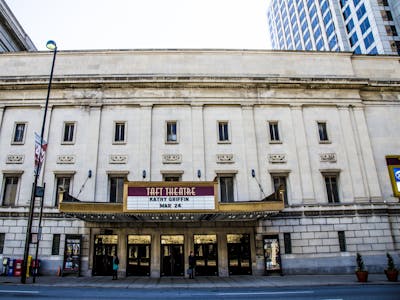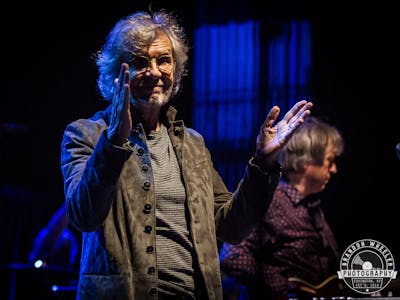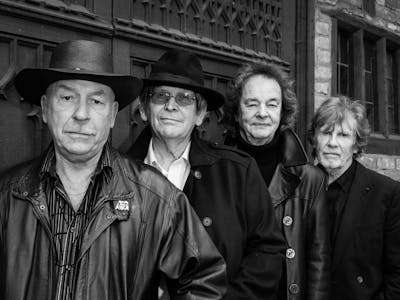So many seminal albums have become part of the musical tapestry that it’s easy to forget their historical context. Imagine that it's June 1967 - it’s been barely a year since The Beach Boys' landmark album Pet Sounds reconfigured what albums could mean and how they could sound. The Summer of Love is going strong in the United States and Rock and Roll has found its legs and is expanding in a dozen thrilling directions. The Beatles have literally just finished recording and releasing Sgt. Pepper's; John Lennon's mellotron still sits in Abbey Road Studios, waiting for Rod Argent's eager hands. Five English youngsters (Chris White, Rod Argent, Colin Blunstone, Hugh Grundy and the late Paul Atkinson) step in to the studio with a batch of songs they've been diligently rehearsing. After the success of "She's Not There" and "Tell Her No", hopes are high for The Zombies.
Sessions go well and wrap up in August. Despite a strong batch of songs and pristine production, the first two singles ("Care of Cell 44" and "Friends of Mine") fail to make an impact. Disheartened, the band breaks up in December. That's a massive, meteoric arc to travel in just six months and the story could have ended there. Fortunately, "Time of the Season" caught on the U.S. and Odessey and Oracle found new luster and appreciation from fans and artists in later years. Acceptance came too late for them to capitalize on as a group, but the album is now widely regarded as a classic and both Mojo and Rolling Stone place Odessey and Oracle in their top 100 albums of all time.
And the wheel has turned ‘round again - The Zombies are currently on tour playing Odessey in its entirety. We chatted with founding member Chris White (who wrote seven of the songs on Odessey and played bass on the album) about some of the history around the album and what it's like to finally get recognition a half a century later.
On Production and Youthful Mastery
You were all barely in your twenties during the recording of Odessey and Oracle and that included your engineer, Geoff Emerick who worked with The Beatles (on Sgt. Pepper’s, Revolver, and later Abbey Road). Everything from the lyrics (the majority of which you wrote) to the sonics, arrangement and musicianship still sound supremely confident and mature over fifty years later. How were you able to develop such confidence and craftsmanship so quickly?
Odessey & Oracle was our first production. At all previous recording sessions, we weren’t allowed to be at the mixing sessions - that was usual practice at the time. Rod and I (being the primary writers) were a bit fed up with this system. Songs began to not sound as we heard them in our heads. We used to record demos of new tracks we had written and most often preferred how they sounded - because we were at those mixing sessions. Having the chance to record in Abbey Road studios with Geoff Emerick and Peter Vince, we took to it like ducks to water. Because the engineers were our age, we got on so well with them and they understood our ideas. The Beatles had just left the studios a few days before - having just finished Sergeant Pepper and the engineers were well versed in experimental ideas. We had rehearsed the new songs so well; it didn’t take long to lay them down.
On Brian Wilson and Pet Sounds
Speaking of young, brilliant creators, Rod [Argent] has cited the influence of Brian Wilson (just a few years older than yourselves) on your music, particularly his use of integral basslines on Pet Sounds. When you were recording Odessey, did you ever dream the group would be revisiting the album fifty years later on a tour with one of its primary sonic influences?
When we toured in the last few years performing Odessey & Oracle as a celebration - along with the hard-working touring band, we got Darian Sahanaja to play the extra keyboards. We met him first when we worked with the Brian Wilson Band at a benefit concert for our late guitarist Paul Atkinson. Darian was the main man with Brian. Although we thought that being on tour with the fantastic Brian would be a great concert, we never dreamed it would happen. And now (dreams coming true) it is going to happen!
On Vocal Arrangements
You shared facilities and instruments with The Beatles, but your treatment of vocals was a bit different. At times it feels your approach was closer to The Beach Boys or even what Queen did years later. One of my favorite songs that you wrote and share co-lead vocals on is “Brief Candles”. It’s beautiful the way it starts off with simple voice and piano and then bursts into that stunning layered chorus. I read that Odessey was recorded (at least in part) on the same four track used on Sgt. Pepper’s, so there must have been technical limitations to getting that richness. If the songs started with your bass parts, how did the group navigate arranging the gorgeous vocals around those foundational parts and building up such a rich sound?
Abbey Road at that time was only using 4-track machines. Sometimes we would bounce down the 4 tracks to 2 tracks on a second machine. Then we had two more tracks which we could use to add more vocals. On the main ‘harmony’ tracks, Rod usually put down the main keyboards first. Then we added extra vocals. Rod was an expert on crafting harmonies. He had been in a choir which sang many modern and classical works. We all were fans of jazz also. we didn’t often use ’normal’ harmonies.
On Timing, Context and Hindsight
As lovely as the album is, I’ve always felt there was a sinister edge to it, particularly on “Time of the Season”, especially the opening bassline and percussive sighs. It’s simple, but immediately and eerily catchy. The song was recorded in ’67 during The Summer of Love, but didn’t get released until ’68, and didn’t break in the U.S. until ’69. The world in the U.S. changed radically in the meantime – the moon landing, political assassinations, racial unrest, Charles Manson, Altamont – and people had to experience the album in a new social context. Do you think that’s one of the reasons the U.S. was more receptive to the song or is it just hindsight that puts it in a different perspective?
At that time, we probably felt in tune with the youth ideas of the day and the possibility that a new hopeful era was beginning. Later it became warped by commercial influences - but we felt the positive vibes of the era. So, Rod’s song felt right. It didn’t fit in with fashion at the time - but 18 months after we split up (due to having no money) it slowly got to number 1 in the USA charts. What a pleasure that was, but Rod and I had continued with writing and producing. We also were working on Rod’s band ‘Argent’ and Colin Blunstone first solo album. So, we didn’t reform then.
On How Their Sound May Have Evolved Had They Stuck Together
Odessey and Oracle was recorded in June – November 1967 and was released in April 1968. There was an enormous amount of high quality material coming out of the U.K. at about the same time from classic groups including The Beatles (Sgt. Pepper’ s Lonely Hearts Club Band , May ‘67) , Pink Floyd (The Piper at the Gates of Dawn, August ‘67), and The Kinks (Something Else by the Kinks, September ’67). The latter album (including the stunning “Waterloo Sunset”) also sold poorly both in the U.S. and the U.K. Those bands evolved their sounds, some of them radically so. You all continued to record in various combinations and it’s interesting to see how you individually evolved. You seem to be the connecting link between The Zombies and subsequent projects - both with your work with Rod on Argent and Colin on his solo project. Argent explored more prog rock type music including the massive hit (which you co-wrote) “Hold Your Head Up”. That doesn’t seem like it would have happened if The Zombies stayed together. Rock was fairly new when you started and it was evolving rapidly. A lot of other genres came out after you broke up – prog, heavy metal, rap, new wave, punk, disco – but, as a group, you weren’t around to react to those changes. I was listening to “Breathe Out, Breathe In” and my wife walked in and thought I was listening to Steely Dan, but “Any Other Way “sounds like a Zombies’ classic. How do you think the group’s sound may have evolved had you stayed together on a continual basis and continued that artistic back and forth and reacted to music as it developed around you?
That is difficult to answer. We are very happy today that Colin and Rod (and their touring Zombies band) are still creating and recording new material. We can’t change the past - and wouldn’t want to. But because we grew up together musically and as friends, it is wonderful that we can get together to perform Odessey and Rod and Colin are still creating new material. Celebrating the classic and exploring new territory. The best of all worlds. We just like creating.
On Success at Last
The fate of Odessey is a tale of missed timing, similar to albums by bands like Big Star or The Velvet Underground – music and bands that had massive influence after the fact, but took the world a while to catch up and appreciate. This year The Zombies were inducted into The Rock & Roll Hall of Fame after being eligible for thirty years and nominated three previous times. You’re on the road celebrating the 50thanniversary of Odessey with Brian Wilson on the “Something Great from ‘68” tour. In “This Year Will Be Our Year” you wrote, “…this will be our year/took a long time to come”. How sweet is it to perform that song every night and realize it’s finally true?
Wonderful. To realize, and be told, that we influenced many musicians, is a dream. At our induction, Brian May came into one of our interviews just to tell us how much we influenced Queen. Tom Petty, Paul Weller, Dave Grohl and Al Kooper all said the same thing. To find out that so many of our musical heroes say that is a great honour. After all the years in the background, it is a great feeling that our music still lives. As I said at the induction to the RRHOF, songs are the bookmarks of all our lives. My life is marked at various times by specific songs. It is fantastic to find that our songs are markers in lots of lives.
The Zombies play Taft Theatre on Monday 9/23 as part of the “Something Great from '68” tour with Brian Wilson, Al Jardine and Blondie Chaplain.




